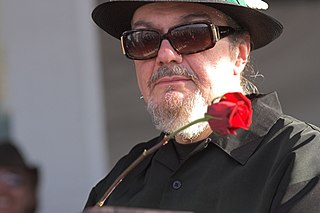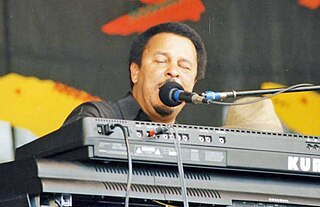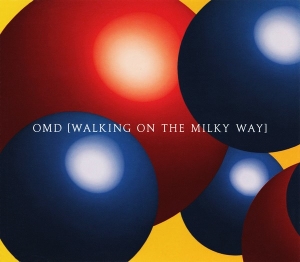Walking to New Orleans may refer to:
- Walking to New Orleans (song), a 1960 song by Fats Domino
- Walking to New Orleans (album), a 2019 album by George Benson
- Walking to New Orleans, a 1974 book by John Broven
Walking to New Orleans may refer to:

Joseph Harry Fowler Connick Jr. is an American singer, pianist, composer, actor, and former television host. As of 2019, he has sold over 30 million records worldwide. Connick is ranked among the top 60 best-selling male artists in the United States by the Recording Industry Association of America, with 16 million in certified sales. He has had seven top 20 U.S. albums, and ten number-one U.S. jazz albums, earning more number-one albums than any other artist in U.S. jazz chart history as of 2009.

Antoine Dominique Domino Jr., known as Fats Domino, was an American singer-songwriter and pianist. One of the pioneers of rock and roll music, Domino sold more than 65 million records. Born in New Orleans to a French Creole family, Domino signed to Imperial Records in 1949. His first single "The Fat Man" is cited by some historians as the first rock and roll single and the first to sell more than 1 million copies. Domino continued to work with the song's co-writer Dave Bartholomew, contributing his distinctive rolling piano style to Lloyd Price's "Lawdy Miss Clawdy" (1952) and scoring a string of mainstream hits beginning with "Ain't That a Shame" (1955). Between 1955 and 1960, he had eleven Top 10 US pop hits. By 1955, five of his records had sold more than a million copies, being certified gold.
Moonwalk may refer to:
No or NO may refer to:

Malcolm John Rebennack, Jr., better known by his stage name Dr. John, was an American singer and songwriter. His music combined New Orleans blues, jazz, R&B, soul and funk.

Allen Richard Toussaint was an American musician, songwriter, arranger, and record producer. He was an influential figure in New Orleans rhythm and blues from the 1950s to the end of the century, described as "one of popular music's great backroom figures." Many musicians recorded Toussaint's compositions. He was a producer for hundreds of recordings: the best known are "Right Place, Wrong Time", by longtime friend Dr. John, and "Lady Marmalade" by Labelle.

Wilson Turbinton, professionally known as Willie Tee, was an American keyboardist, songwriter, singer, producer and notable early architect of New Orleans funk and soul, who helped shape the sound of New Orleans for more than four decades.

Venus and Mars is the fourth studio album by the British–American rock band Wings. Released in May 1975 as the follow-up to Band on the Run, Venus and Mars continued Wings' run of commercial success and provided a springboard for a year-long worldwide tour. The album was Paul McCartney's first post-Beatles album to be released worldwide by Capitol Records rather than Apple.
Voodoo may refer to:
New or NEW may refer to:
New Orleans is a city and a metropolitan area in the U.S. state of Louisiana.
Robert Charles Guidry, known as Bobby Charles, was an American singer-songwriter.
"Walking to New Orleans" is a 1960 song by Bobby Charles, written for and recorded by Fats Domino. The record was a hit, released on Imperial Records, reaching #6 on the pop chart and #2 on the R&B chart.
Saints and Sinners may refer to:

"Walking on the Milky Way" is a song by English electronic band Orchestral Manoeuvres in the Dark (OMD). It was released as a single on 5 August 1996 and appeared on their Universal album a month later. The song reached number 17 on the UK Singles Chart, becoming the group's first UK top-20 hit in over five years, and their last UK top-40 single. The band were flanked by a full string orchestra for their Top of the Pops performance of the song broadcast on 16 August 1996.
"Just a Closer Walk with Thee" is a traditional gospel song and jazz standard that has been performed and recorded by many artists. Performed as either an instrumental or vocal, "A Closer Walk" is perhaps the most frequently played number in the hymn and dirge section of traditional New Orleans jazz funerals. The title and lyrics of the song allude to the Biblical passage from 2 Corinthians 5:7 which states, "We walk by faith, not by sight" and James 4:8, "Come near to God and He will come near to you."
"1492" is the first song on Counting Crows' 2008 album Saturday Nights & Sunday Mornings. Adam Duritz announced in a voicemail message to his fans on January 12, 2008, that this song would be released as part of a digital 45 release to precede the release of Saturday Nights & Sunday Mornings, with "When I Dream of Michelangelo" to be featured as its B-side. It is, however, not the lead commercial single, as "You Can't Count On Me" was released as the lead airplay/video single on February 4, 2008.
Blue Velvet may refer to:

P.J. Morton is an American musician, singer, songwriter and record producer. Since 2012, he has been the keyboardist for the pop band Maroon 5. Morton originally joined the band as a touring member in 2010 and became an official member in 2012 after Jesse Carmichael went on a short hiatus.

Sonic Highways is a 2014 American documentary miniseries directed by Dave Grohl and written by Mark Monroe. The documentary was made concurrently with Foo Fighters' eighth album, Sonic Highways, and was broadcast on HBO. Grohl described the project as "a love letter to the history of American music". Each of the eight episodes is presented as an exploration of the musical history of a different American city through a series of interviews by Grohl. The group is also shown incorporating what they learned from the interviews into the writing and recording of a new song in or near that city. The series debuted on October 17, 2014.